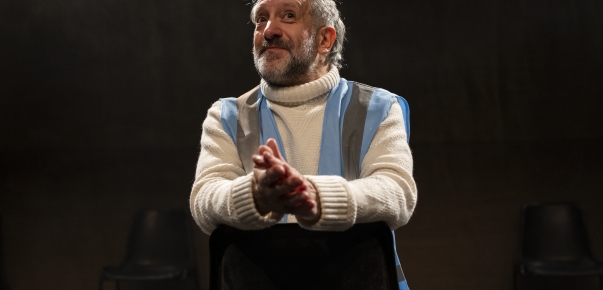Stephen Brown's Blog:
20 Oct 2009All this talk of making writers redundant – or making everyone into a writer – I feel a chill wind on the back of my neck – leads me naturally to The Factory’s sort-of-improvised version of The Seagull.
Sort-of-improvised?
The way it works is this. At the beginning of the show, the cast draw lots to see who will perform which role. Perhaps three actors are able to do Konstantin, for example. Every time, in other words, the ‘pack’ of actors is shuffled. No two shows will have exactly the same combination of performers.
The chosen performers then present Chekhov’s great play more or less in the order Chekhov wrote it – except that they do so, more or less, in their own words. They also use their own names and refer to the present-day world around them. (‘Moscow’ becomes ‘London’; there were some funny riffs on crop circles and Tom Baker.) There’s no set, a few chairs, a table, props borrowed from the audience and the actors are dressed in their own clothes. (A lot of them are wearing skinny jeans, as it happens.)
The effect is – at its best – to make The Seagull absolutely contemporary and wholly owned by the performers. It helps of course that The Seagull is partly about a familiar world of actors and writers, that there is an experimental play-within-a-play in it, and that the scenes have a slightly chaotic, changeable feel even in the original. But the urgency and immediacy of the performances was, when I saw the production on the Saturday, startling and deeply moving.
The moment in Act 3 when Konstantin (or here, the actor’s name, Tim) has his bandage changed by his mother (here, Amanda) was played with great stillness and tenderness; Trigorin (here, Jethro) had cool danger and offered a blistering, remarkable fluent justification of his life as a writer; Masha (here, Amanda) seemed fatalistic to her core.
How do they do it?
Each actor boils down their character’s words and actions to a list of units. Each unit must be further distilled into a single word: this list of words becomes the actor’s mnemonic for their performance.
Here, for example, is the beginning of the units used by Simon Muller, who played the doctor (Dorn in the original) on Saturday:
Enter
Hot
Accused
Middle Age
Do
Astound
Idealism
Honest
Improved
Clearly too, the actors must think deeply about their characters, and will have read the play in several different versions.
Yet what we see is, crucially, each actor finding their character in their own words and their own world. Inevitably, Chekhov’s precision and poetry is sacrificed (though there are moments of unexpected poetry); but the rhythm of Chekhov – the ways his characters speak and argue – and the peculiarly Chekhovian way of writing a character – talkative, querulous, changeable, selfish, philosophical – comes through very strongly. Chekhov’s characters seem absolutely modern. (Have we changed so little?)
Federay Holmes, another one of The Factory crew, tells me that the actors feel an extraordinary closeness to Chekhov while improvising. They have to learn to trust to the deep structure of that writer’s thinking. (It’s very good for deflating the ego – I want to come back to this question of improvisation and ego in another post…)
I should add that the version I saw on Sunday – its particular combination of actors and the spur-of-the-moment choices they made – seemed less successful. Thus one of the deficits of improvisation…
Kate Yedigaroff, producer of Bristol Jam, who was also very moved by the performance on Saturday, suggested that it was both the truthfulness of the performances and the combination of vulnerabilities – the rawness of Chekhov’s characters echoed by the exposure of the actors in improvisation – that gave the performance its particular emotional charge.


